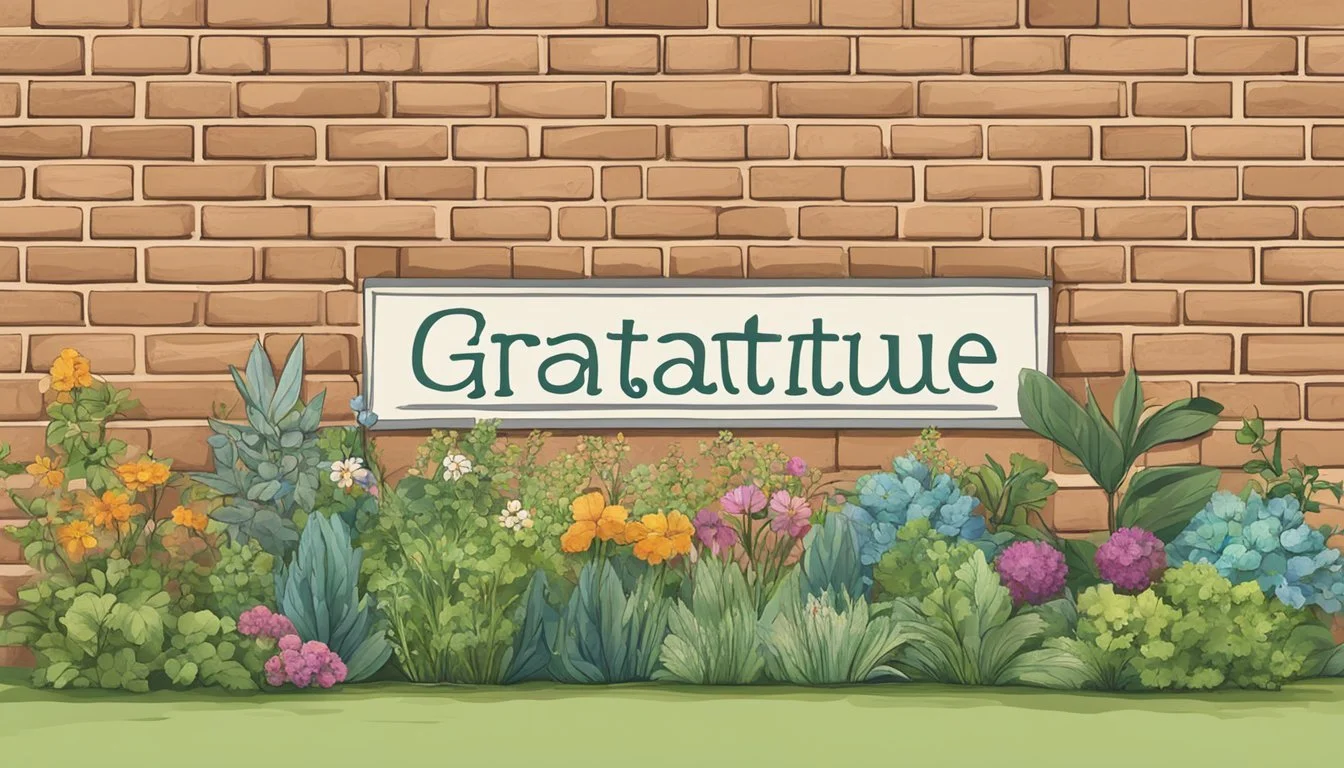6 Ways to Cultivate Gratitude
Practical Tips for a Happier Life
Gratitude, the simple act of recognizing and appreciating the good in life, has significant benefits for mental and emotional well-being. Many find that incorporating gratitude into daily routines can lead to a more positive outlook and increased happiness. Understanding the ways to cultivate gratitude can empower individuals to harness these benefits effectively.
Engaging in various gratitude practices can enhance personal relationships, improve mental health, and increase overall life satisfaction. By exploring different methods and making a conscious effort to be more thankful, anyone can experience the profound impact of gratitude.
1) Keep a Gratitude Journal
Keeping a gratitude journal can significantly impact one's mental well-being. Journaling regularly about things you're grateful for helps shift focus to positive aspects of life.
Depth in journaling is more beneficial. Rather than listing many items, elaborating on specific experiences or people can enhance gratitude's effects. For example, describe an interaction with a loved one rather than just naming them.
Incorporating different types of gratitude exercises can keep the practice engaging. Suggestions include a "three good things" exercise, where one notes down three positive elements of their day. This can be a helpful routine for maintaining a gratitude habit.
Personalizing the journal adds value. Reflecting on individuals for whom you're grateful, rather than just events or objects, tends to have a more profound impact. This approach can foster deeper emotional connections.
Using creative formats like a gratitude jar might also add a fun twist to the practice. Instead of writing in a book, people can write their gratitude notes on slips of paper and collect them in a jar.
Starting a gratitude journal does not require any specific time. It can be done in the morning to set a positive tone for the day or at night to reflect on the day's positives. Regularity is key.
2) Express Thanks to Others
Expressing gratitude verbally is powerful and impactful. Simple words like "thank you" can uplift anyone's mood. A heartfelt expression of gratitude shows appreciation and strengthens bonds. For those whom you can't thank in person, making a phone call often brightens their day.
Personalized notes add a special touch. Writing a short, sincere message can make someone feel valued and recognized. This handwritten gesture often leaves a lasting impression.
Thoughtful gifts can also convey appreciation. Consider the recipient's preferences and choose something meaningful. It doesn’t have to be extravagant; small, considerate gifts often mean the most.
Spending quality time with someone can also express gratitude. Planning a day together or sharing an experience shows how much you value their presence.
Acts of kindness further demonstrate appreciation. Simple gestures like helping with a task or offering support can speak volumes. These actions show that you care and acknowledge their efforts.
3) Practice Mindful Meditation
Mindful meditation is a powerful way to cultivate gratitude. It focuses attention on the present moment, allowing individuals to appreciate what they have. This practice often begins with deep breathing. By paying attention to each breath, one can become more grounded and centered.
During meditation, it's beneficial to think about things one is grateful for. This can be anything from simple everyday moments to profound experiences. As thoughts of gratitude fill the mind, a sense of warmth and appreciation often follows.
Finding a quiet, comfortable place to meditate can enhance the experience. Whether it's at home or in nature, the environment should support relaxation. Closing the eyes and focusing on the breath can help in letting go of distractions and centering the mind.
Using guided meditations can be helpful, especially for beginners. Resources like those found in the 12-minute meditation to cultivate embodied gratitude provide structured sessions that guide through the process. Regular practice can lead to sustained feelings of gratitude and well-being.
Incorporating these sessions into daily routines can make the practice more effective. Even a few minutes a day can make a significant difference. The key is consistency and genuine intention to appreciate the positives in life.
4) Volunteer in Community
Volunteering within the community is a powerful way to cultivate gratitude. By contributing time and effort to help those in need, individuals gain a deeper appreciation for what they have.
Engaging in local volunteer programs can promote a sense of shared responsibility. This involvement helps in building stronger connections with others and fosters a sense of belonging.
Volunteering also provides opportunities to see the direct impact of one’s efforts. Witnessing positive changes in the community can reinforce feelings of appreciation and thankfulness.
Participating in community service can introduce individuals to diverse perspectives and life experiences. This exposure often leads to a greater understanding and empathy for others' situations.
Overall, volunteering allows individuals to make meaningful contributions, creating a ripple effect of gratitude and positivity. Volunteering is a tangible way to give back while also nurturing personal growth and gratitude. Programs aimed at addressing local challenges underscore this.
Additionally, fostering a culture of appreciation and connection within volunteer groups can further enhance this sense of gratitude. Creating environments of support and camaraderie among volunteers can solidify their commitment and appreciation for the cause.
5) Create a Gratitude Jar
A gratitude jar is a simple and effective way to cultivate gratitude daily.
Start by selecting a jar that you can decorate to make it visually appealing. Use images, stickers, or drawings that represent things you're grateful for.
Place the jar in a central location where you'll see it often. This ensures that adding notes becomes a habit.
Each day, write down something you're grateful for on a small piece of paper. It could be anything from a kind gesture to a personal achievement.
Drop the notes into the jar. Over time, this collection of gratitude notes will serve as a physical reminder of positive moments in your life.
Periodically, take time to read through the notes in the jar. This can be a powerful way to reflect on and appreciate the joyous moments and blessings you’ve experienced.
For additional ideas on creating and decorating a gratitude jar, check out this guide.
Involving family members or friends in filling the jar can also make it a shared practice, fostering a collective sense of gratitude. A gratitude jar can be a powerful tool for enhancing mindfulness and positivity.
6) Read about Positive Stories
Reading positive stories can significantly boost one's sense of gratitude. By exposing oneself to stories of gratitude, individuals can see how others have transformed their lives through appreciation and thankfulness.
One way to explore positive stories is by visiting websites dedicated to sharing tales of gratitude. For example, the Daily Inspired Life website offers a collection of stories that highlight the transformative power of gratitude.
Another excellent resource is the Life Blog, which features real-life gratitude stories. These accounts showcase how embracing gratitude has positively impacted people's lives.
Additionally, books that compile stories of gratitude can be a great source of inspiration. These collections often feature a variety of experiences, providing diverse perspectives on how gratitude can manifest in different situations.
Incorporating the practice of reading positive stories into daily routines can help reinforce a gratitude mindset. By regularly engaging with these stories, individuals are reminded of the good in the world and encouraged to acknowledge the positive aspects of their own lives.
Understanding Gratitude
Gratitude is a multifaceted concept deeply rooted in human psychology and benefits. It encompasses recognizing positive aspects and appreciating their sources.
Definition of Gratitude
Gratitude involves recognizing and appreciating the positive things in life. It is not limited to monumental events but extends to everyday blessings like a good meal or a kind gesture.
A key aspect of gratitude is acknowledgment. This includes understanding that these good things are often due to external sources, like people or circumstances beyond one's control. This perspective fosters humility and interdependence.
Gratitude can be both a fleeting feeling and a long-term attitude. It shapes how individuals perceive and interact with the world. Often, it leads to improved relationships and a more fulfilling life.
The Science Behind Gratitude
Research shows that gratitude positively impacts mental and physical health. Studies indicate that grateful people experience lower levels of stress and depression.
One study from Johns Hopkins University highlights that gratitude can curb negative emotions and foster a more thankful state of mind. This deliberate shift can improve overall well-being.
The neurological basis of gratitude involves brain regions like the prefrontal cortex and anterior cingulate cortex. These areas are associated with emotional regulation and rewarding social interactions. Practicing gratitude regularly can enhance these neural pathways, making positive thinking more habitual.
Incorporating gratitude exercises into daily routines is recommended by experts for sustained benefits. Activities like keeping a gratitude journal or meditating on positive experiences can significantly bolster mental health.
Benefits of Practicing Gratitude
Practicing gratitude can significantly impact both mental and physical well-being, with distinct advantages in each area.
Mental Health Benefits
Gratitude has been shown to alleviate symptoms of depression and anxiety. When individuals focus on positive experiences and express thankfulness, they can shift their mindset away from negative thoughts. This positive outlook can lead to increased happiness and life satisfaction.
Expressing gratitude also builds resilience, making it easier for people to bounce back from stress and adversity. Research indicates that those who maintain a gratitude practice experience a greater sense of meaning in their lives and enjoy stronger interpersonal relationships. In essence, gratitude enhances emotional well-being and nurtures a positive mindset.
Physical Health Benefits
Gratitude isn't just beneficial for the mind; it positively impacts physical health as well. Regular gratitude practice can lead to better sleep quality, decrease fatigue, and enhance overall physical wellness. People who are grateful tend to have lower blood pressure, which reduces the risk of heart disease and other related conditions.
Further, gratitude is linked to healthier lifestyles. Those who practice gratitude are more likely to engage in regular exercise and make better dietary choices. This holistic approach to well-being suggests that gratitude can act as a catalyst for maintaining a balanced and healthy body.
Common Barriers to Gratitude
Various obstacles can hinder people's ability to cultivate gratitude. Two primary barriers include the tendency to focus on negative experiences and having unrealistic expectations.
Overcoming Negativity Bias
Negativity bias refers to the human tendency to pay more attention to and remember negative experiences over positive ones. This bias can impede gratitude by making it difficult to recognize positive aspects of life.
Practicing mindfulness can help reduce this bias. By staying present and actively acknowledging positive moments, individuals can counterbalance the automatic focus on negativity. Additionally, keeping a gratitude journal can shift focus from what went wrong to what went right.
Engaging in gratitude exercises, like listing daily positives, can rewire the brain over time. This consistent practice can help diminish the impact of negativity bias.
Addressing Unrealistic Expectations
Unrealistic expectations about life circumstances can make it challenging to feel grateful. When individuals set high, often unattainable standards, they may overlook small, yet significant, positive moments.
Revising expectations to align more closely with reality is crucial. By setting achievable and realistic goals, people can appreciate progress and small wins. This shift can foster a more grateful mindset.
Educational efforts to highlight the importance of realistic expectations can assist individuals in recognizing and adjusting their standards. This adjustment helps in celebrating daily achievements rather than getting bogged down by unmet lofty goals. Adopting a grateful attitude involves recognizing and valuing even the minor positive aspects of life.




